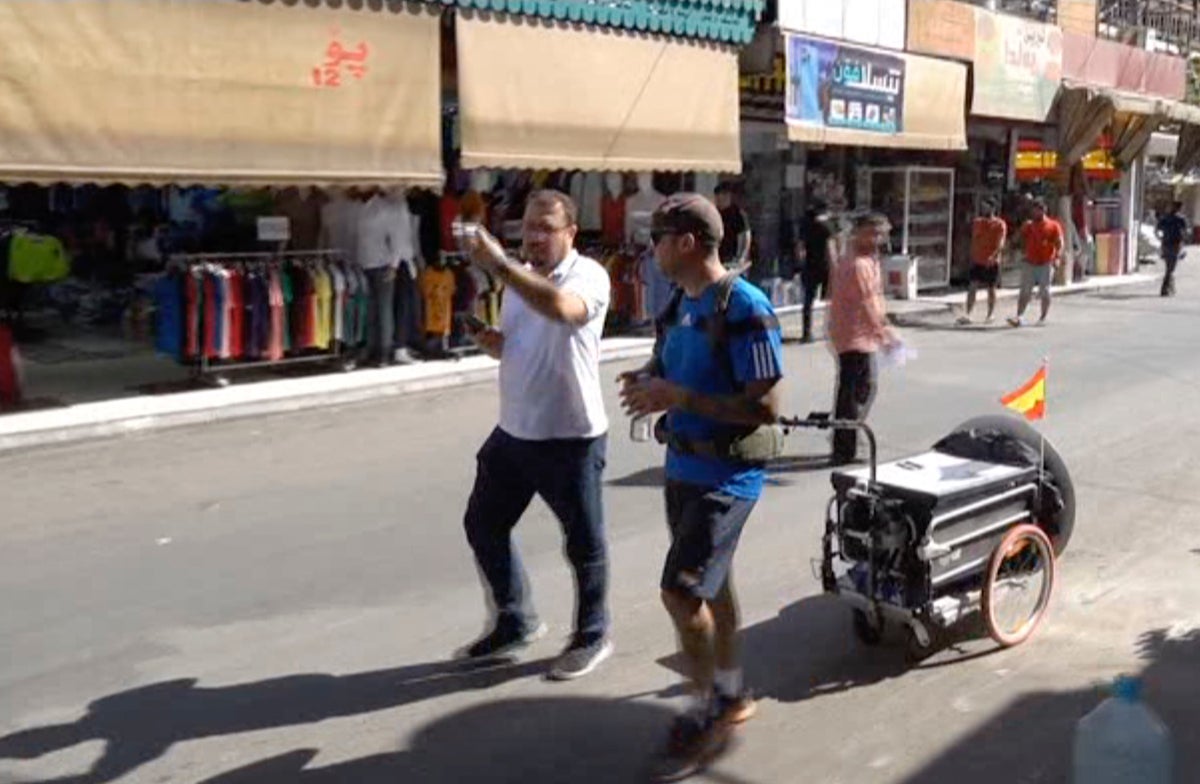
A Spanish man who was documenting his ambitious journey by foot from Madrid to Doha for the 2022 FIFA World Cup has not been heard from since crossing into Iran three weeks ago, his family said Monday, stirring fears about his fate in a country convulsed by mass unrest.
The experienced trekker, former paratrooper and fervent soccer fan, 41-year-old Santiago Sánchez, was last seen in Iraq after hiking through 15 countries and extensively sharing his journey on a popular Instagram account over the last nine months. But his exuberant posts stopped suddenly on Oct. 1, the day he entered Iran from the country's volatile northwestern border.
Sánchez's family says his daily WhatsApp updates stopped that day as well. Weeks later, they fear the worst.
“We are deeply worried, we can’t stop crying, my husband and I,” his mother, Celia Cogedor, told The Associated Press.
Sánchez's parents have reported him as missing to Spain’s national police and the Foreign Ministry.
But Spanish authorities say they have no information about his whereabouts, adding that the Spanish ambassador to Tehran was handling the matter.
Calls to the Iranian Foreign Ministry seeking comment were not immediately returned on Monday.
Sánchez's reported disappearance in Iran — his last stop before reaching Qatar for the World Cup — comes as protesters rise up across the Islamic Republic in the largest antigovernment movement in over a decade. The demonstrations erupted on Sept. 16 over the death of Mahsa Amini, a 22-year-old woman taken into custody by Iran’s morality police for allegedly not adhering to the country’s strict Islamic dress code.
Tehran has violently cracked down and blamed foreign enemies and Kurdish groups in Iraq for fomenting the unrest, without offering evidence. The Iranian Intelligence Ministry said authorities had arrested nine foreigners, mostly Europeans, over their alleged links to the protests last month. Westerners and dual nationals have increasingly become pawns in Iran's internal political struggles and in tensions between Tehran and Western capitals, analysts say, with at least a dozen dual nationals arrested in recent years on disputed spying charges.
Sánchez arrived in Iraqi Kurdistan in late September, after trekking thousands of kilometers (miles) carrying a small suitcase in a wheeled cart, packed with little more than a tent, water purification tablets and a gas stove for his 11 months on the road. He said he wanted to learn how others lived by living among them before reaching Qatar, the first World Cup host country in the Arab world, in time for Spain's first match on Nov. 23.
“The idea of the journey is to motivate and inspire other people to show that they can go very far with very little,” he told the AP from Sulaymaniyah, a Kurdish city in northeastern Iraq. “You can go a long way walking.”
The day before he disappeared, Sánchez had breakfast with a guide in Sulaymaniyah. The guide, who spoke on condition of anonymity for fear of reprisals, said he tried to warn Sánchez about the dangerous political situation in Iran as they parted ways.
Protests in Iran's Kurdish region after Amini's death kindled the nationwide unrest still roiling Iran. In response, Iranian forces have unleashed drone and artillery attacks targeting Kurdish separatists in northern Iraq.
But Sánchez was undeterred and confident, the guide said.
“He didn't look nervous at all. He told me, ‘I sorted out everything, don’t worry,’” he said. They communicated through Google Translate, as Sánchez only speaks Spanish.
Sánchez, the guide added, planned to meet an Iranian family in the Kurdish town of Marivan — a scene of recent antigovernment protests. The family, delighted by Sánchez's Instagram posts, had reached out and offered to host him.
After Sánchez crossed the border on Oct. 1, his messages became sparse and cryptic, the guide said. Sánchez told him that things were “very different” in Iran from Sulaymaniyah, the Iraqi metropolis filled with parks and cafes.
“It's been a long story,” his last message read.
Sánchez's parents said he had warned them he'd temporarily lose internet access after reaching Iran.
"The country is ‘hot,' and there are no communications," Sánchez told his father in his last message on Oct. 1, possibly a reference to the turmoil in Iran's Kurdish region and the government's disruption of internet and popular communications applications used by protesters.
His parents tried not to fret when their messages didn't deliver. But their worries grew as the weeks passed.
The Spanish Foreign Ministry said it had registered Sánchez's border crossing into Iran and was not ruling out any possibilities.
In his last Instagram update, the night before he crossed the Iranian border, he posted images of his emotional farewell to Iraq and told of a Kurdish family's generosity. He had planned to camp on a mountain, but the owner of a nearby farm took him in, giving him a bed, shower and a hearty dinner.
Pictures on Instagram show him eating bread and chicken soup, smiling and posing with young boys from the village and drinking tea over an open fire.
“Conclusion:” he wrote, “Lose yourself to find yourself.”







